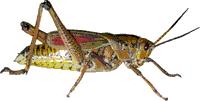Entomology Collections, General

Entomology Papers from Other Sources
Document Type
Article
Date of this Version
2000
Abstract
Although the immediate effects of temperature stress are well documented, the longer-term effects of such stresses are more poorly known. In these experiments, we investigate the effects of suboptimal and supraoptimal temperatures during pharate adult development on fecundity in the flesh fly, Sarcophaga crassipalpis Macquart. A 1 h cold shock at -10°C during the red-eye pharate adult stage decreases the fecundity of both sexes. Induction of rapid cold hardening by pre-treatment at 0°C for 2 h partially prevents reproductive impairment. Heat shock of pharate adults for 1 h at 45°C also reduces fecundity in both sexes, but inducing thermotolerance by pre-treatment at 40°C for 2 h affords protection only to females. Males heat shocked at 45°C or first pre-treated at 40°C consistently fail to transfer sperm to the females. The injury inflicted on males by heat shock is most pronounced when the stress is administered to pharate adults or adults; wandering larvae and true pupae are unaffected. The implications of these data for naturally occurring populations are discussed.


Comments
Published in Physiological Entomology (2000) 25, 330-336.